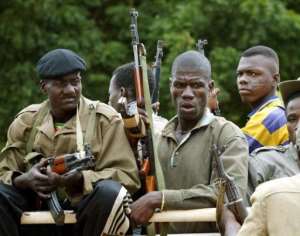
THE HAGUE (AFP) - The International Criminal Court gave its prosecutor the green light Thursday to extend a probe into war crimes in Ivory Coast back to 2002, when rebels failed to depose then president Laurent Gbagbo.
The probe, which will also look into crimes against humanity, including murder, which "appeared to have been committed by rebel and government forces in the months following the coup d'etat," the court's judges said in a public document.
"The Chamber expands its authorisation for the investigation in Cote d'Ivoire to include crimes within the jurisdiction of the Court allegedly committed between 19 September 2002 and 28 November 2010," The Hague-based judges said.
The failed coup lead to widespread reprisals in the west African country, once hailed as a beacon of stability in the region, which then split into a mainly Christian south and Muslim north.
"The Chamber concludes that there is reasonable basis to believe that, in the course of these events, acts of murder and rape that could amount to war crimes or crimes against humanity were committed," the judges said.
This included an incident on October 6, 2002, when rebel forces executed 131 people in their stronghold of Bouake, central Ivory Coast, including 61 gendarmes, a similar number of children and seven other civilians.
In similar fashion, government forces attacked the village of Monoko-Zohi near Daloa, northeast of the capital Yamoussoukro on November 27 and 28, 2002, "shooting as many as 120 civilians who were mostly immigrant plantation workers."
But judges pointed out: "Government forces committed offences of murder and rape throughout the territory of the Cote d'Ivoire during a prolonged period of time (at least between 19 September 2002 and March 2006)."
"These attacks against the civilian population resulted in, at a minimum, hundreds of deaths and the rape of many individuals."
ICC prosecutor Luis Moreno-Ocampo first got the thumbs-up from judges on October 3 last year to probe crimes committed in the west African country after disputed November 28, 2010 polls led to the death of an estimated 3,000 people.
Post-vote violence broke out after Gbagbo, 66, refused to step down after polls in favour of his long-time rival and now current President Alassane Ouattara.
Five months of unrest followed in the world's largest cocoa grower, before Gbagbo was arrested at his heavily fortified home in April last year by forces loyal to Ouattara, with UN and French military backing.
Gbagbo, who blames France for orchestrating his imprisonment, was taken to the northern Ivory Coast and kept under house arrest.
He was transferred to the ICC's detention unit in The Hague on November 30 last year and is currently facing four counts of crimes against humanity.
Gbagbo is to appear before a confirmation of charges hearing on June 18 where evidence will be heard whether he should go to trial or not.
Pascal Turlan, advisor to the prosecutor's office, told AFP Moreno-Ocampo's office was not under obligation to issue arrest warrants against persons responsable for crimes committed since 2002, "but we could."
"It was natural to focus on the post-election violence first because of the severity of the crimes committed between November 2010 and April 2011 is at least equal to the previous eight years," he said.
The ICC, founded in 2002 is the first international criminal tribunal to prosecute perpetrators of genocide, crimes against humanity and war crimes.




 We’ll no longer tolerate your empty, unwarranted attacks – TUC blasts Prof Adei
We’ll no longer tolerate your empty, unwarranted attacks – TUC blasts Prof Adei
 Bawumia donates GHc200,000 to support Madina fire victims
Bawumia donates GHc200,000 to support Madina fire victims
 IMF to disburse US$360million third tranche to Ghana without creditors MoU
IMF to disburse US$360million third tranche to Ghana without creditors MoU
 Truck owner share insights into train collision incident
Truck owner share insights into train collision incident
 Paramount chief of Bassare Traditional Area passes on
Paramount chief of Bassare Traditional Area passes on
 Two teachers in court over alleged illegal possession of BECE papers
Two teachers in court over alleged illegal possession of BECE papers
 Sunyani: Victim allegedly shot by traditional warriors appeals for justice
Sunyani: Victim allegedly shot by traditional warriors appeals for justice
 Mahama vows to scrap teacher licensure exams, review Free SHS policy
Mahama vows to scrap teacher licensure exams, review Free SHS policy
 Government will replace burnt Madina shops with a new three-story, 120-store fac...
Government will replace burnt Madina shops with a new three-story, 120-store fac...
